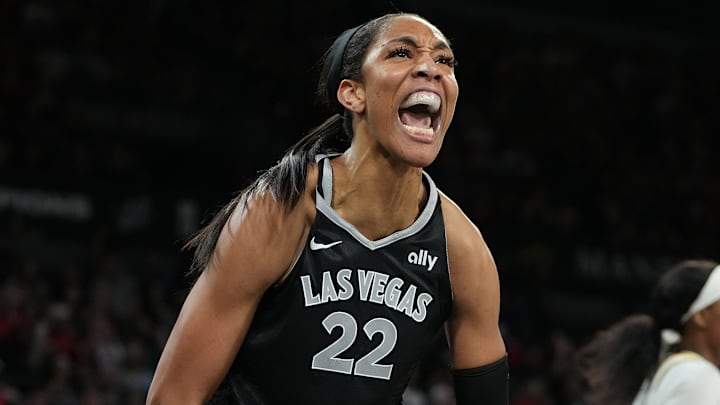A’ja Wilson Got Better at Everything While Compromising Nothing

A’ja Wilson entered this WNBA season firmly established as one of the most impressive talents in the league, a perennial All-Star, a back-to-back champion, a two-time MVP. And then she followed that up with something remarkable. The Las Vegas Aces forward found a way to get even better in 2024. She expanded her skill set, putting together arguably the best season in league history, unanimously winning her third MVP and making herself SI’s WNBA Player of the Year.
There is no easy comparison for her performance. No WNBA player has ever scored like Wilson did in 2024. Yet it feels inadequate to suggest her biggest accomplishment this year was breaking the scoring record. What made Wilson’s season impressive was not what she did, but how she did it: No one had ever been so efficient while doing so much to impact the game around her. The scoring record may ultimately be the headline of her season. But consider what she did in every other area of the statsheet.
Order Now. SIP January Year In Review. Get Sports Illustrated's Year in Review issue. dark
While she was scoring more than she ever had before, she also rebounded more, blocked more, stole more and recorded more assists while committing fewer turnovers. Wilson began shooting more from midrange and from three without sacrificing her presence in the paint. This is someone who already had been honored multiple times as MVP and Defensive Player of the Year—and she got better at everything without compromising anything. The cumulative effect did not feel like sharpening her game so much as expanding its possibilities.
“Even with all the pressure that she has, she just keeps showing up,” Aces guard and Olympic teammate Jackie Young told SI this summer. “She continues to get better every year, and it’s so hard to get better at this level, but she does. It just shows the type of person that she is.”
Of course it was U’nanimous.
— Las Vegas Aces (@LVAces) September 22, 2024
♠️ First 1’000 point season in WNBA history
♠️ WNBA record for points in a season
♠️ WNBA record for rebounds in a season
♠️ The only player in @WNBA and @NBA history to lead a season in points, rebounds and blocks.@_ajawilson22 // #ALLINLV pic.twitter.com/i5lR5xq5vr
Put her in conversation with the record she broke. Diana Taurasi had stood alone since 2006 as the only WNBA player to average 25 points per game. She reached that mark while leading the league in threes, a model of fierce, offensively minded guard play. Her record went untouched for more than a decade and a half. And then came Wilson and her 26.9 ppg, setting the record for scoring while being among the strongest defensive forces in the WNBA, ultimately setting a record for rebounding, too. There can be debates about whether it was the best individual season in the history of the league. But it feels impossible to argue that it was not the most complete one.
The best measure of that may be her player efficiency rating. Wilson narrowly missed the all-time record—finishing a few decimal points behind Lauren Jackson’s second MVP season in 2007. But look at her statistics in the context of the other players on that leaderboard. Even in the context of the most productive, efficient performers in league history, Wilson still manages to stand out. It’s not just that she was the most prolific scorer of the group. It’s that she was the most prolific everything. Wilson led this set in every major statistical category other than PER:
Player | Year | PER | PPG | RPG | BPG | APG |
|---|---|---|---|---|---|---|
Lauren Jackson | 2007 | 35.1 | 23.8 | 9.7 | 2.0 | 1.3 |
A’ja Wilson | 2024 | 34.9 | 26.9 | 11.9 | 2.6 | 2.3 |
Lauren Jackson | 2006 | 34.6 | 19.4 | 7.6 | 1.7 | 1.6 |
A’ja Wilson | 2023 | 32.8 | 22.8 | 9.5 | 2.2 | 1.6 |
Elena Delle Donne | 2015 | 32.6 | 23.4 | 8.4 | 2.1 | 1.4 |
Yolanda Griffith | 1999 | 32.1 | 18.8 | 11.3 | 1.9 | 1.6 |
Wilson impacted almost every aspect of the game. If she entered the league as a traditional big, she has stretched her skillset into something more dynamic, less constrained. Her range has grown accordingly: While she still dominates in the paint, Wilson took an increasingly large proportion of her shots this year from midrange and beyond, including nearly doubling the number that she took from more than 15 feet. The Aces placed more of a premium on her ballhanding skills and occasionally tasked her with bringing the ball up the floor. She can still be among the best examples of a classically talented post player. But she’s also come to represent something more.
“A is so dynamic that she definitely can get the rebound and then push it in transition,” Aces guard and Olympic teammate Kelsey Plum told SI this season. “She’s like a big guard.”
All of that offered a new vision of her talent. Wilson had never played quite like this before. And neither had anyone else in the league.
More WNBA on Sports Illustrated
feed
